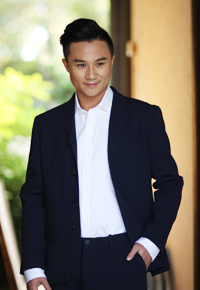Chinese artists bring ‘Kunqu’ to world
Chinese “Kunqu” opera artist Zhang Jun is a forward-thinking man who also knows how to respect and value tradition.
Zhang, a UNESCO Artist for Peace, came to Korea for the first time to attend the third Culture Communication Forum that was held in Seoul from Sept. 4 to 6.
“I am very happy to visit the home of K-pop,” said the 38-year-old actor last Thursday during an interview with The Korea Times. “I used to be a huge fan of boy group H.O.T. but I haven’t had a chance to catch up with K-pop because of my heavy schedule.”
Zhang, regarded as the “Prince of Kunqu Opera,” started to learn the dance at the age of 12 when his parents introduced him to the performing art. Since then he has acted played many leading roles in famous Kunqu productions such as “The Peony Pavilion,” “The Palace of Eternal Youth” and “The Jade Hairpin.” “The vast majority of Koreans may still be unfamiliar with what Kunqu is because it is true that the opera not as popular as contemporary music. But it’s important to know that Chinese plays have their roots in Kunqu, as does the 200-year-old Beijing opera,” he said.
Kunqu opera is regarded as one of the major milestones in the history of Chinese drama. Regarded as the “Mother of Chinese Operas,” it is a 600-year-old theater that uniquely blends poetic eloquence, musical refinement and drama, and has deeply influenced all the other forms of Chinese performance art. It is the first and foremost Chinese performing genre and was proclaimed by UNESCO as one of the Masterpieces of the Oral and Intangible Heritage of Humanity in 2001 for it outstanding value.
The artist has also won China’s top performing awards including the Magnolia Performing Art Award in 1999 and the Meihua (Plum Flower) Award in 2008. He used to be actor and deputy Director at the Shanghai Kunqu Opera Troupe for 15 years, and is currently artistic director of the Shanghai Zhang Zun Kunqu Art Center.
The performer is different from other practitioners of traditional Chinese arts ― he is modern and dresses fashionably and also speaks fluent English. He said he has been focusing on revitalizing the art form and promoting it to a younger generation.
“I have always tried to keep traditional art alive but at the same time I try to understand what the young generation likes and wants by communicating with them,” said Zhang. “So I came up with this idea of mixing tradition and modernity. I performed Kunqu in modern dress with a mix of original Kunqu music with electronic sound and rock and roll.”
The world-class artist emphasized the importance of respecting and accepting other cultures in order to maintain and develop one’s own.
“If you want others to respect your culture and tradition, you should be able to engage and embrace others as well. For me, I have had many chances to experience different cultures. I am now turning these experiences into opportunities to collaborate with other countries while promoting and revitalizing Kunqu at the same time.”
The Chinese actor expressed his wish to collaborate with Korean arts, especially “pansori,” a form of Korean folk music.
“I absolutely loved the Sugungga performance yesterday. I was very impressed. I like the way that performers stood on the stage, like a triangle,” the actor said.
“I would love to perform Kunqu in Korea and definitely would like to join a pansori team and perform in harmony one day.” <The Korea Times/Rachel Lee>




























































